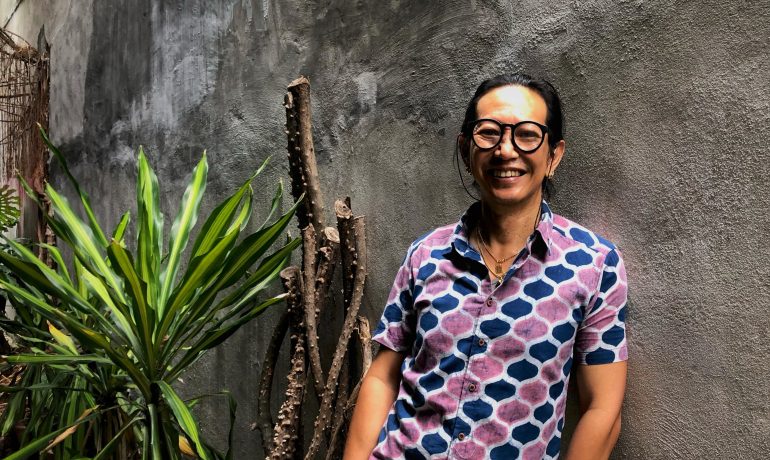Sinkeh, Penang’s homegrown independent art space, closed its curtains in late 2020 under the pressure from the Covid-19 pandemic. Behind Sinkeh’s closed doors, Chee Sek Thim re-discovers what’s essential for life and the arts.
By Lee Kwai Han
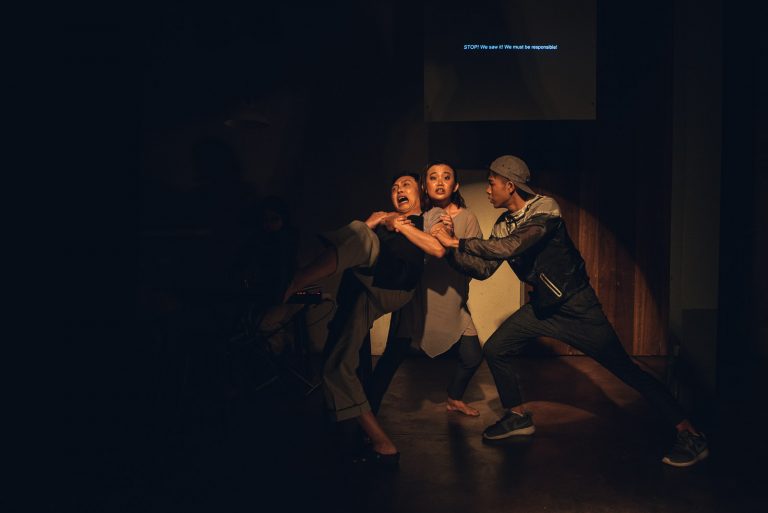
Hokkien musical drama Tai Ji Tua Teow (代誌大條) (2018), produced by ZXC Theatre Troupe, directed by Chee Sek Thim
Sinkeh, strategically located on Lebuh Melayu, was once a meeting space for theatre practitioners local and foreign alike. After its closure in 2020, the shophouse has now turned into Chee Sek Thim’s private residence. In the art space nestled in the heart of Sinkeh, Chee, an experienced theatre director, dancer, actor, and educator, shares his renewed views on the nuances of supporting Penang’s performing arts.
Chee has been involved in Malaysia’s performing arts for over 28 years. Other than performing in plays and dances, his directorial projects span a wide range of themes, forms, and languages. His past directorial projects include plays such as The Descendants Of The Eunuch Admiral (2000), That was the Year (2007), (A Modern Woman Called) Ang Tau Mui (2011), The Sandpit: Womensis (2012), and Malam Takdir (2019); a contemporary opera titled Conference of the Birds (2009); monologues Cakap Dapur: R & D Stories (2015) and A Complete Woman (2017); as well as Cheras, the Musical! (2015).
Chee likens his stage-directing process to gardening. He constantly adjusts and adapts as he learns about his actors’ personalities and emotions as well as the team’s dynamics. “Humans are beyond control. As is the weather,” Chee says as he watches over his green and soothing courtyard garden right outside the art space. Each performance he stages is his mindful work of patience and attention in bloom, like the flowers of his plants.
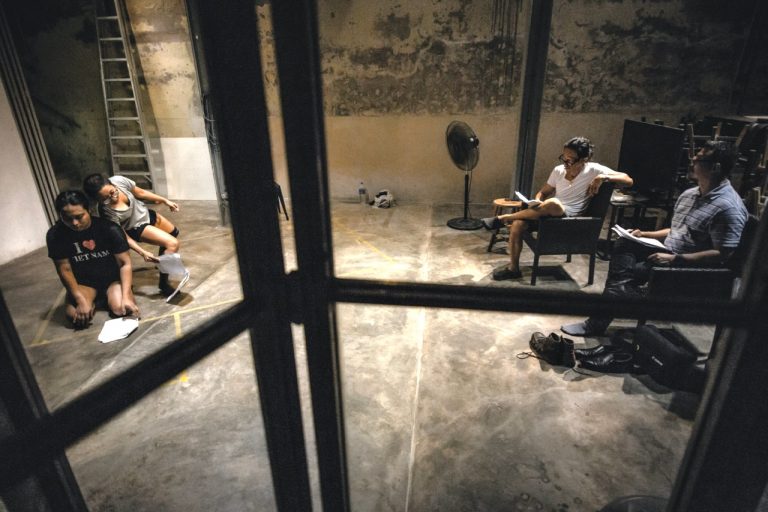
Rehearsal for Johan Othman’s Malam Takdir (2019) in Sinkeh, directed by Chee Sek Thim.
The Making of an Art Patron
Chee’s passion in the arts was seeded at an early age. He learnt piano when he was a child and was involved in theatre and art activities throughout his primary and secondary school years. After returning to Malaysia with a Master of Fine Arts from the University of Notre Dame, USA, he started performing with Marion D’Cruz and Dancers in 1993. Later, in 1999, Chee participated in Krishen Jit’s Directors’ Workshop and started working alongside Krishen Jit, Leow Puay Tin, and other collective members of Five Arts Centre.
Chee embodies the spirit of experimentation in his art practice and dedicates himself to arts education through teaching in colleges. In 2002, he established Reka Art Space in Petaling Jaya, with the vision to support young artists’ development through workshops and art classes and to provide a platform for presenting their artworks.
Plowing Penang’s Seedbed of Creativity
Since the onset of Penang’s art and cultural tourism industry in the early 2010s, Chee has been passionate and critical about challenges and opportunities to develop the creative environment in Penang. Chee envisioned a model for sustainable art practice in Penang by tapping into the rising tourism industry. He came back to Penang in 2014 and established Sinkeh, a nine-room guesthouse with an art space. The guesthouse provided income to art practitioners who work with it, while the art space was open for the art practitioners to pursue their creative projects.
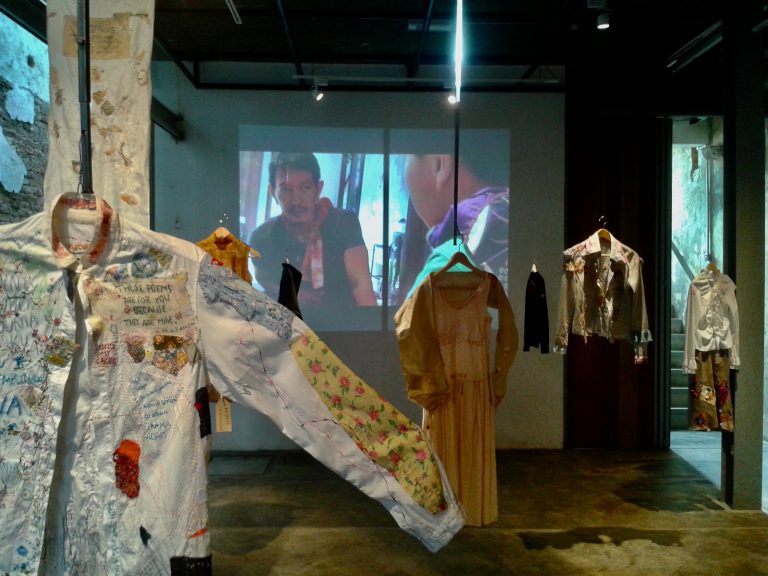
Dressed Text (2014), an art exhibition by Foo May Lyn in Sinkeh
Bringing Reka Art Space with him to Penang, Chee strategised a multi-faceted approach to support young artists’ development. In Sinkeh, he organised the first Initiate. Develop. Perform (I.D.P.) workshop in 2015 to guide young performing arts practitioners through the process of initiating, developing, and presenting their art projects. Wayang di Sinkeh was then launched in 2017 as a platform for staging new experimental productions weekly over each three-month season.
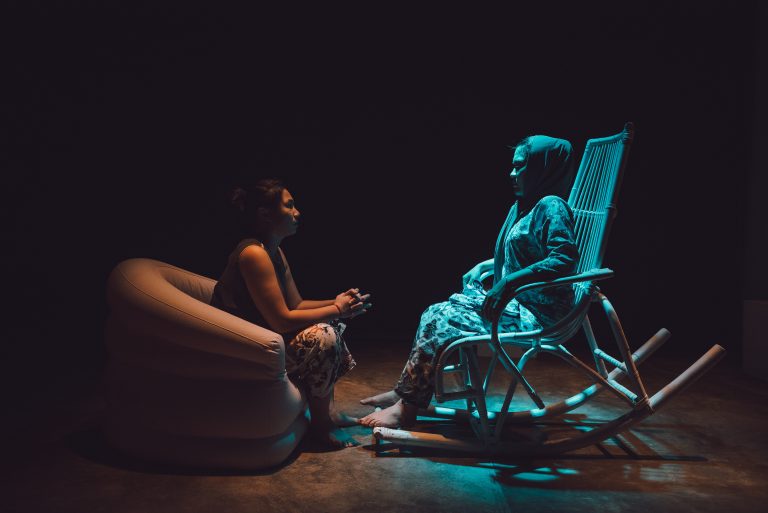
Lina & Lijah, directed by Nur Hilyati Ramli, was staged in Wayang di Sinkeh 2017.
However, Chee observed a general lack of enthusiasm among local practitioners to lead performing arts projects. The demand for further professional development programmes have also been low. Chee identified the rarity of art writers and art critics in Penang as a significant contributing factor to this alarming condition. “The art doesn’t grow without a complete loop of constructive feedback from the art writers and critics,” he explains. Diving into a broad-based health check for the arts scene, the challenges and opportunities Chee raised as a panelist in the “Can You Imagine? The Creative Environment in Penang” dialogue session 12 years ago remains relevant for cross-examination with today’s Penang art scene after the Covid-19 disruption.
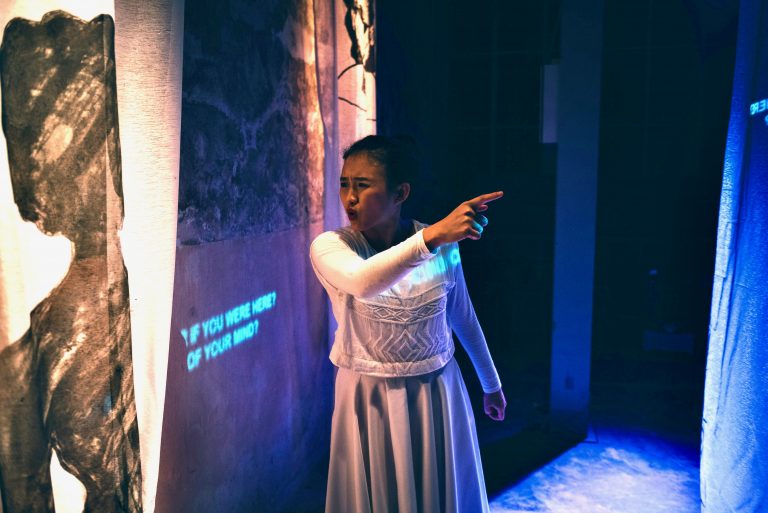
Staged in Wayang di Sinkeh 2017, Fragrance was directed by young director and actor, Riz Zolkepli who also directed Siapa Salbiah (2015) under Reka Art Space’s I.D.P. Workshop.
Growth as a Continuous Losing and Recovery of Balance
Nowadays, Chee finds it important to focus on what’s essential for life and for art. Chee thinks a more considered and measured way of theatre-making will be his way forward. He will be re-starting his work on Malam Takdir, a play written by music composer Johan Othman. Revised from the 2019 version, Malam Takdir will be re-staged in 2023 as an opera as it was originally conceived. In June 2021, after the last I.D.P. workshop in January 2021, Chee has also been teaching again, as an industry fellow at the School of the Arts, Universiti Sains Malaysia.
There shall be blooms from Chee’s renewed education and stage-directing effort again. To quote John Dewey’s book, Art as Experience, “Like the soil, mind is fertilized while it lies fallow until a new burst of bloom ensues.”
All images courtesy of Chee Sek Thim.
Lee Kwai Han manages arts and environmental education projects in Penang. Despite her training in engineering, she believes arts is the software solution our society needs

